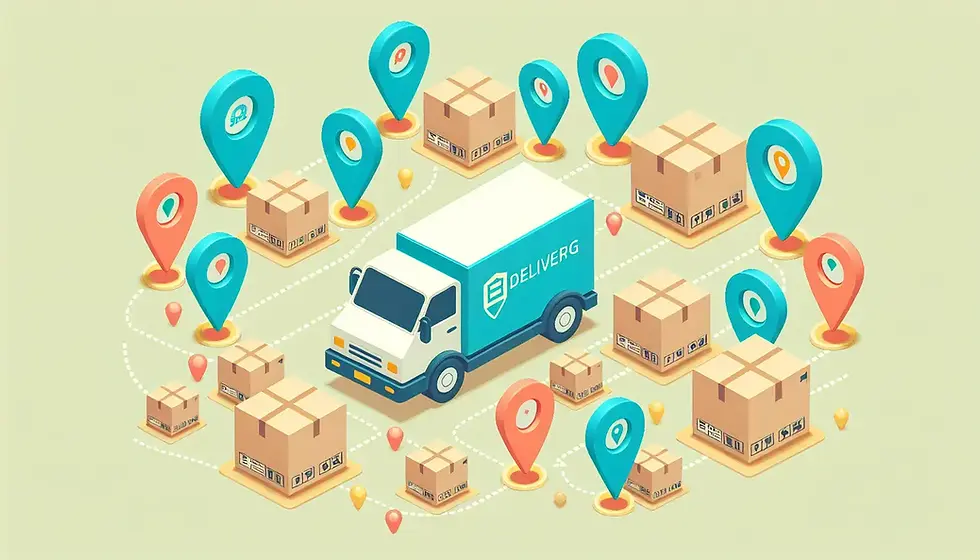10 Mistakes to Avoid in Ecommerce Logistics for Small Businesses
- Aug 15, 2024
- 4 min read
Diving into the world of ecommerce can be thrilling for small businesses. It's a gateway to expanding your reach and scaling your operations. However, navigating ecommerce logistics can be a tricky affair. In this blog, we're going to explore ten common pitfalls that small businesses encounter in ecommerce logistics and provide you with the know-how to sidestep these obstacles. Let's decode the essentials of efficient ecommerce logistics management together!

1. Underestimating the Complexity of Shipping Costs
One of the first hurdles small business owners encounter in ecommerce logistics is underestimating how complex shipping costs can be. It's not just about getting the product from point A to B. Factors like distance, package size, weight, and shipping speed all play into the final cost. Incorporating these variables into your pricing strategy without overcharging or undercharging can be like walking a tightrope. Overlooking any of these factors can lead to a mismatch in expected profit margins and operational costs.
Moreover, small businesses sometimes miss out on potential savings by not researching different carrier options or leveraging volume discounts. Shipping carriers often offer discounts for businesses that ship in bulk. By not tapping into these savings, you're likely leaving money on the table. This aspect of ecommerce logistics requires diligence and an understanding that shipping is not just a cost but an investment in customer satisfaction and loyalty.
2. Overlooking the Importance of Packaging
The second common mistake in ecommerce logistics is not giving packaging the attention it deserves. Packaging is not merely about aesthetics; it plays a crucial role in product protection during transit. Poor packaging can lead to damaged goods, returns, and disappointments, directly impacting your brand's reputation. Sustainable packaging options also offer a tremendous opportunity to resonate with eco-conscious consumers.
It's also worth mentioning that unique, high-quality packaging can enhance the unboxing experience, creating a memorable moment for your customers. This boost in consumer delight can significantly affect your brand loyalty and encourage repeat purchases. Investing in quality and thoughtful packaging is a wise decision that goes beyond the logistics; it's a marketing strategy that speaks volumes about your brand’s values.
3. Ignoring the Value of a Solid Returns Policy
A transparent and customer-friendly returns policy can be a game-changer for small ecommerce businesses. Many businesses perceive returns management as a cost center, but it’s actually a critical component of ecommerce logistics that can drive sales and build trust. A clear, fair returns policy puts customers at ease, making them more likely to make a purchase. Neglecting this area can lead to customer hesitation and lost sales.
4. Neglecting Customer Communication and Tracking
Effective communication and tracking are the backbone of a seamless ecommerce experience. Small businesses often miss the mark by not providing enough transparency and updates during the shipping process. Today’s customers expect timely updates about their orders. Failure to communicate effectively can lead to frustration and a poor customer experience, which can be detrimental to your business.
Implementing an automated tracking system that sends regular updates to customers can significantly enhance the customer experience. It’s also essential to have a responsive customer service team ready to address any concerns or inquiries. This level of proactive communication fosters trust and confidence in your brand.
5. Failing to Optimize Inventory Management
Inventory management is often the unsung hero of ecommerce logistics. It involves not just knowing what you have in stock but also predicting what will be in demand. Poor inventory management can lead to stockouts during crucial sales periods or excessive inventory that ties up capital. Small businesses need strategies like just-in-time inventory to avoid these pitfalls by maintaining optimal stock levels and responding agilely to market demands.
6. Not Leveraging Technology for Efficiency
In today’s digital age, there are numerous technological solutions designed to streamline ecommerce logistics, yet many small businesses fail to take advantage of these tools. From inventory management software to customer relationship management (CRM) systems, technology can automate and simplify many logistics processes. This oversight can leave your business lagging behind, as competitors use technology to improve efficiency, reduce costs, and enhance the customer experience.
7. Overlooking the Importance of Local Delivery Options
As ecommerce becomes increasingly localized, small businesses have a unique opportunity to differentiate themselves by offering local delivery options. These can range from same-day delivery services to convenient in-store pickup options. However, many small businesses do not explore these possibilities due to perceived complexity or cost. This oversight can result in missed opportunities to connect with local customers and build a loyal community around your brand.
8. Not Planning for Peak Seasons
Each year, peak shopping seasons represent a significant opportunity for ecommerce businesses. Unfortunately, many small businesses fail to plan adequately for these critical periods. Without proper planning, businesses can find themselves struggling with inventory shortages, shipping delays, and overwhelmed customer service. This lack of preparedness not only affects sales but can also harm customer relationships and your brand’s reputation in the long term.
9. Underestimating the Need for Scalability
Scalability is a critical aspect of ecommerce logistics, yet many small business owners underestimate their future needs. As your business grows, so too will your logistics requirements. Failing to plan for scalability can leave you scrambling to meet demand or forced to make rapid changes that could disrupt your operations. An adaptable and scalable logistics plan is essential for supporting business growth and ensuring you can handle increased sales volume without compromising service quality.
10. Ignoring Global Ecommerce Logistics Trends
Lastly, staying informed about global ecommerce logistics trends is crucial for staying competitive. With the ecommerce landscape constantly evolving, new technologies, strategies, and consumer preferences emerge regularly. Small businesses that overlook these trends risk falling behind competitors who are more attuned to the changing market. Continuous learning and adaptation in response to global trends are essential for securing your place in the ecommerce world.



Comments